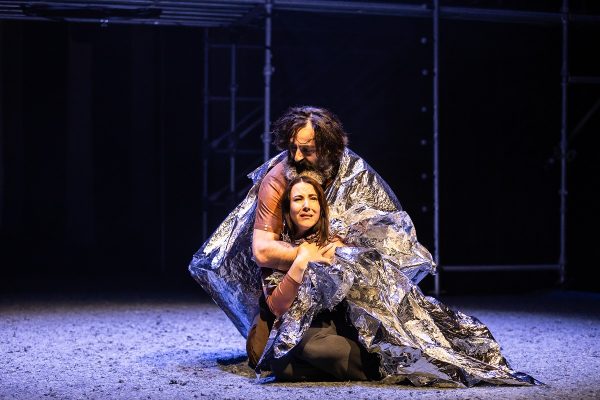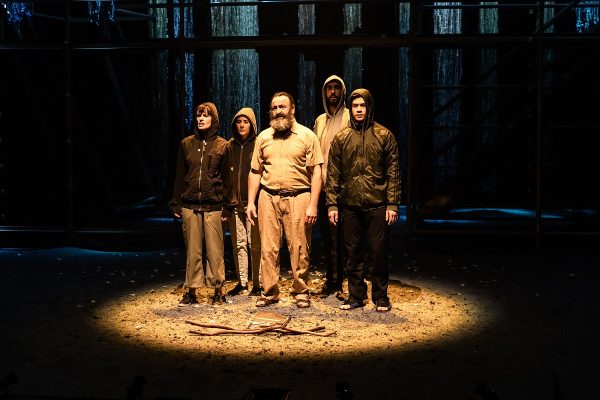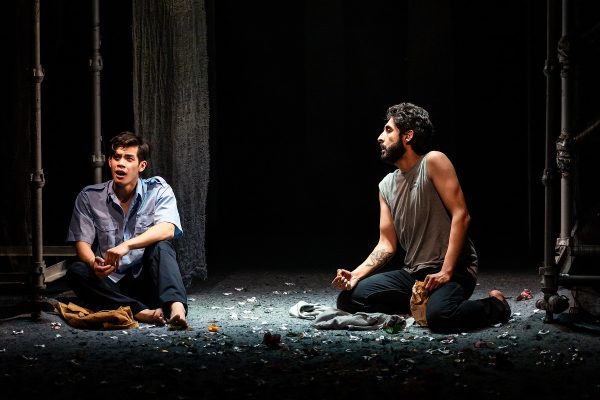
Theatre / “Rough Magic” by Helen Machalias. At The Street Theatre until November 19. Reviewed by HELEN MUSA.
THE title of Helen Machalias’ play “Rough Magic” is taken from Shakespeare’s “The Tempest”, but the playwright has drawn on far more than that in her angry look at events of 2010 following the shipwreck of “Siev 221” at Flying Fish Cove off Christmas Island.
Visually magnificent, the production is directed by Beng Oh, designed by Imogen Keen, lit by Gerry Corcoran, sound design by Kyle Sheedy, with dramaturgy from Granaz Moussavi and Rebecca Clode, to create the mysterious ambience of a magical island.
Plaintive Iranian melodies join the sounds, while Keen’s set evokes the tropical trees of the forest, the deck of a boat and the cloud-capped palaces of ancient Persepolis.

Oh’s sophisticated understanding of theatre-art ensures that the play’s kaleidoscope of scenes is imaginatively handled, as cast members, while playing character roles, also merge into the background as assorted asylum seekers, locals and tourists in an episodic plot covering a storm at sea, an introduction to the diving spots of Christmas Island, media messages from named Australian politicians and conversations with Australian journalists. Lainie Hart plays most of the supernumeraries with ease.
The central story focuses on three asylum seekers and a Christmas Island “native”.
Taking her inspiration from Shakespeare, Machalias names her characters from “The Tempest’s” magic-obsessed Prospero, his innocent daughter Miranda, a free spirit, Ariel and Caliban, indigenous to the island. This is a theatrical convention signalling that we are not up for a night of naturalistic narrative.
In a confection as rich as Ariel’s favourite sweet made of almond paste and rosewater, references include a pre-revolutionary kids’ story “The Little Black Fish,” the poetry of Hafiz, and Iran’s defining cultural epic, Ferdowsi’s “Shahnameh” (The Book of Kings).

Beginning as “The Tempest” does with a storm at sea, the play extracts maximum drama from the Flying Fish Cove wreck.
Prospero (George Kanaan) forgets he has a daughter and saves himself, but the resourceful Miranda (Kaitlin Nihill), who has recently learnt how to swim, stays afloat and is rescued by locals, including Caliban (Andre Le). Ariel (Reza Momenzada) is left with an unhappier burden – the body of his baby daughter Esteri, forbidden a respectful burial.
In Act I, “Sea Sorrow”, we find that the pragmatic Prospero has a book in which he meticulously records the stories of asylum seekers, allowing him to trade information on them for better treatment.
Miranda is given the freedom of the island, which she wanders with detention centre worker Caliban, who, like his Shakespearean forbear, knows every inch of the island and is guardian to Christmas Island’s famous crabs.
Ariel is a more enigmatic shapeshifter, fiercely proud of his heritage, with a revolutionary spirit that leads him to contact with Australian journalists.
Shakespeare-lovers will recognise Caliban’s famous ode to the sights and sounds of his native island, snippets of Prospero’s speech where he abjures his “rough magic” and the “Blow, Winds and Crack Your Cheeks” aria from “King Lear”.
It will take a keener eye to spot some of the Iranian cultural references, like those to the compassionate bird the Simorgh or the blessing of Imam Hossein.
As the play progress towards act III, “Earth”, there is a shift of tone as gradually the asylum seekers are processed and either released or sent to Villawood.
But can this story ever be taken to a satisfying end?
Machalias obviously thinks not, for there seemed to be several endings to the play, including one where Miranda proclaims, “Our revels now are ended” and another where Prospero physically breaks his magic wand.
But Machalias is not done, and her play turns didactic, heaping scorn on the complicit conduct of Australians and almost dashing the drama on the rocks.
“Rough Magic” begins with a storm, but finishes with a traditional Shakespearean ending as Ariel comes downstage to demand the audience’s applause.
Who can be trusted?
In a world of spin and confusion, there’s never been a more important time to support independent journalism in Canberra.
If you trust our work online and want to enforce the power of independent voices, I invite you to make a small contribution.
Every dollar of support is invested back into our journalism to help keep citynews.com.au strong and free.
Thank you,
Ian Meikle, editor




Leave a Reply